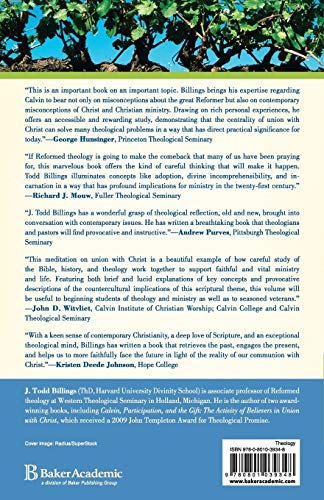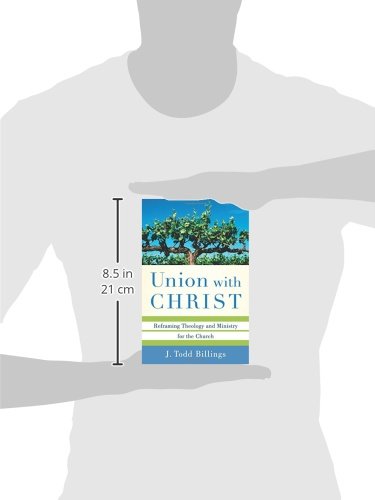Deliver to Japan
IFor best experience Get the App




Full description not available
F**5
Very Instructive
This book has been a real find on the issue of Union With Christ. Billings takes 4 different aspects of our relationship with Christ and shows how it flows from union with Christ and its implications for our daily walk with God in Christ. He explores Adoption, Total Depravity, the Mystery of God, and the Eucharist as means of demonstrating the reality and truth of how we are related to God in Christ. The thing that makes it so good is that it gives a different metaphor to show another perspective what the union really is and how it applies.The fourth chapter which involves the Eucharist and union with Christ also explores the Belhar Confession. This is the confession that expresses the Dutch Reformed Church's repudiation of apartheid in South Africa. It is a practical application of the Eucharist in healing wounds and uniting Christians across racial boundaries. The insights he shares called many divisions along the same lines that we have here in America.The major thing that I learned from the book is Calvin's teaching on double grace - Justification and Sanctification that come in our salvation through the cross of Christ. This is the first time I have read anything about this and it helped put the pieces together for me.All in all, this is a deep, readable book about our walk and union with Christ that has enriched my life greatly. I highly recommend it.
F**D
Fantastic book
Dr. Billings writes clearly to explain the historic doctrine of union with Christ, and to show it it may help us in our particular self-understandings and practices as Christians and as the Church today. One early chapter explains how union with Christ relates to adoption, and the many gifts that we received as adopted sons and daughters because we are united in adoption to Christ Himself. Dr. Billings explains how this can help our understanding of prayer, word, and sacrament as practices by which the Spirit aids us and helps us to live into our new identity. A later chapter on how union with Christ relates to practicing justice is likewise very helpful, explaining the strengths and drawbacks of the Belhar Confession. I wholeheartedly recommend Dr. Billings' book to any layperson, church leader, teacher, or pastor seeking clear and helpful guidance for our lives, for pastoral counsel, and for the life of the Church.
B**E
Incredible starting place on this neglected doctrine.
The body of this work is eye opening for anyone who is a strict Five Point Calvinist. The application section is also eye opening with its look at South African apartheid, how it started and how it was deconstructed in the South African Dutch Reformed Church. The critique of incarnational ministry was incredibly helpful with the doctrine of union with Christ in view.I thoroughly enjoyed this book and passed it along to a church member that teaches at an Evangelical theological seminary that suscribes to the incarnational ministry model for intercultural ministries. Hopefully some discussion with ensue there.I am planning on ordering a few extra copies to keep in my library and hand out from time-to-time.
D**D
Very deep thinking
I read this book as part of a reading group. If I was reading it on my own I would not have finished it. Not by any means that it is poorly written. It is very academic and not a quick read. I will say that I appreciate the author's insights and I found chapter 5 to be my favorite.
D**E
Read it!
Thought provoking connections between important Christian issue facing the church today. One interesting point is the authors connection of gospel application to justice issues. It’s evidence the church is making strides in the right direction.
B**S
Excellent
I'm not far enough into the book to give a credible review. However, I'm highly engaged by the subject matter, and I find Dr. Billings style of writing to be very readable. This seems like a very important book for pastors (like myself), churches and Christians of all kinds.
D**N
Fine book...
that gave me new appreciation for and awe at the reality of my full-privileged inclusion at the Father's table. I am currently using it as a prompt for personal meditation.
H**.
Currently My Favorite Theology Book
Material is fresh and potent. Ideas are great. I would recommend the book until the last chapter, which is a bit too ambitious for the book.
P**W
Interesting persepectives on our union with Christ
This is an interesting book. It is not as systematic as that of Johnson or Letham (both of whom have excellent books on the subject) but its value is in the ways that Billings seeks to apply it. You may not always agree with him, but he will get you thinking. Particularly valuable to me was the way he fleshes out the sin of independence in relation to salvation by grace alone in Christ alone.
D**E
A theology of retrieval
This book explores the theme of union with Christ from a biblical, theological and missionary perspective. It is both helpful and provocative. Only slight negative is that here and there the points are somewhat laboured. Certainly a profitable read.
D**R
Recovering a much neglected doctrine for the life of the church
J. Todd Billings has written an accessible, articulate and challenging book dealing with various doctrinal and practical implications of the Christian's adoption by God through the saving work of Christ and by the agency of the Spirit. While not an exhaustive exploration of the doctrine of union with Christ, this study does explore various aspects and implications of it. This is a work of theological retrieval, drawing on sometimes forgotten themes from past sources, especially Calvin, to bring something long neglected back to the foreground for the edification of the church today.In chapter 1, Billings examines the implications of the doctrine of union with Christ as a much needed corrective for large swaths of the modern church's (especially in North America) practice of the faith as a form of Moral Therapeutic Deism and he shows how a robust understanding of union places us in a relationship with God where we are being graciously conformed to the image of his Son rather than us morphing a detached God into an idol made in our own image and for our own convenience. In chapter 2 Billings discusses Calvin's doctrine of union and how, rightly understood, it counter balances the tendency to misunderstand the doctrine of total depravity in a number of ways by either proponents or opponents of the doctrine (which can have the effect of eroding a right doctrine of the Imageo Dei). Chapter 3 shows how the Christian's union with Christ is central to and essential for our communion with an otherwise unknowable and incomprehensible God. In Chapter 4 Billings explores how a partial recovery of the doctrine of union with Christ formed the basis for some of the steps taken in the church of South Africa helping to kick start the end of Apartheid and how systematic segregation first came about through a racial division at the Lord's Table stemming from a neglect of the doctrine of union. Billings rightly sees this as a functional denial of the doctrine of the unity of the body through union with Christ at the very place which ought to be the most clear demonstration of union with Christ and its implications for the unity of the church. He goes on to show how the liberal church focus on social justice is devoid of its power without a robust belief in union with Christ and conversely he calls the orthodox and conservative to recover this neglected aspect of its own theology in order to restore justice to both thought and way of life. Finally, chapter 5 explores the recent trend to view the incarnation as the model for missional ministry. Billings demonstrates that, while many of the proponents of incarnational ministry are working toward some truly admirable goals and reforming some erroneous practices, when they hold up the incarnation as a pattern, they are doing something that Scripture itself never does. Rather, as the author convincingly shows, it is our union with the crucified and risen and indwelling Christ (by his Spirit) that is the basis and model, as well as the power, for our gospel mission.Again, there are depths that this book does not plumb, and it was not the purpose of this study to go all the way down into the doctrine of union with Christ. Those looking for a deep exegetical exploration or a systematic treatment won't find it here, although both aspects are present and certainly stand behind this work. This study is just right to reintroduce the church to this oft neglected doctrine and to give us a tantalizing taste for the rich fruit that awaits the church that recovers a right theology and reintegrates a right practice of the implications of the union of the church (and the individual Christian) to Christ. I recommend this to pastors, students, well-read laypeople and armchair theologians everywhere.
M**U
Five Stars
Great product-timely delivery-very satisfied
Trustpilot
1 month ago
1 week ago